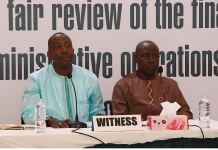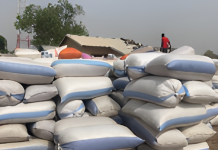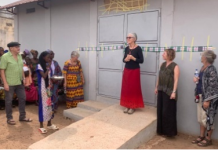By Fatoumatta K Jallow
The Food and Agriculture Organization (FAO) in collaboration with the Department of Fisheries organized a three day training  workshop for communities engaged in fishing. The purpose of the training is to build capacities of the fishing communities to improve in fish handling, processing, quality control and waste management and for the community based organizations to strengthen more effective sustainable management.
workshop for communities engaged in fishing. The purpose of the training is to build capacities of the fishing communities to improve in fish handling, processing, quality control and waste management and for the community based organizations to strengthen more effective sustainable management.
Funded by the FAO technical cooperation programme (TCP), the training workshop was held at Nana Conference Center from 19-21 October.
Biran Laity Fye, National Project Coordinator, FAO TCP, stressed on the types of packaging materials used on their products describing them as critical. This he said is what they will take to the local or international markets noting that the packaging has to be done well to enable them meet the expectations and requirements of the importing countries.
According to him the main reason why they decided to conduct this training workshop is to equip them with the best practices of low cost storage and packaging.
The Director of Fisheries Mr. Matarr Bah, while delivering his remarks said the FAO-TCP project is for the development of the artisanal fisheries in The Gambia. He said its main objective is to assist the Government to enhance the development of artisanal fisheries sub as sector related activities through responsible fishing so that fish stocks are maintained for now.
According to Bah, fish quality and safety cannot be overemphasized as it has a direct bearing on their wellbeing in terms of improved nutritional status and general health conditions of the citizenry.
Mr. Bah explained that the Ministry of the Environment, Climate Change and Natural resources will undertake the necessary steps and reforms to ensure that the Fisheries Act of 2007 and the Fisheries regulations of 2008 reflect the current realities on the ground.
He said the TCP programme will make copies of the Act and regulations to the fisher folks so that they are better able to take full responsibilities of protection and conservation of the fisheries waters in their various localities of operations to curb the practice of illegal, unreported and unregulated fishing activities.
The FAO rep Mrs. Sierra Njie Sanyang also described the fisheries sector as economically and socially important, noting that they provide sustainable livelihoods, proteins of high nutritional value and revenues for fishing communities and the nation as a whole. She said in The Gambia, the fisheries sector contributes 12% to the GDP and the livelihoods of the population, with the potential to make significant contribution to improved food security.
“An estimated 200,000 people are directly or indirectly dependent on artisanal fishery and its related activities for their livelihoods. Fish and fishery products are important ingredients of diet in The Gambia with an estimated catch of 53,000 tons in 2015 from the artisanal sub sectors,” she said.
In conclusion, she said it is also an important source of income for those engaged in fish processing and marketing, many of whom are women. Artisan’s fish processing contributes significantly to the socio economic development of the country and the livelihoods of the people in the Gambia in which women form the majority in fish processing and trade activities, she said.





















